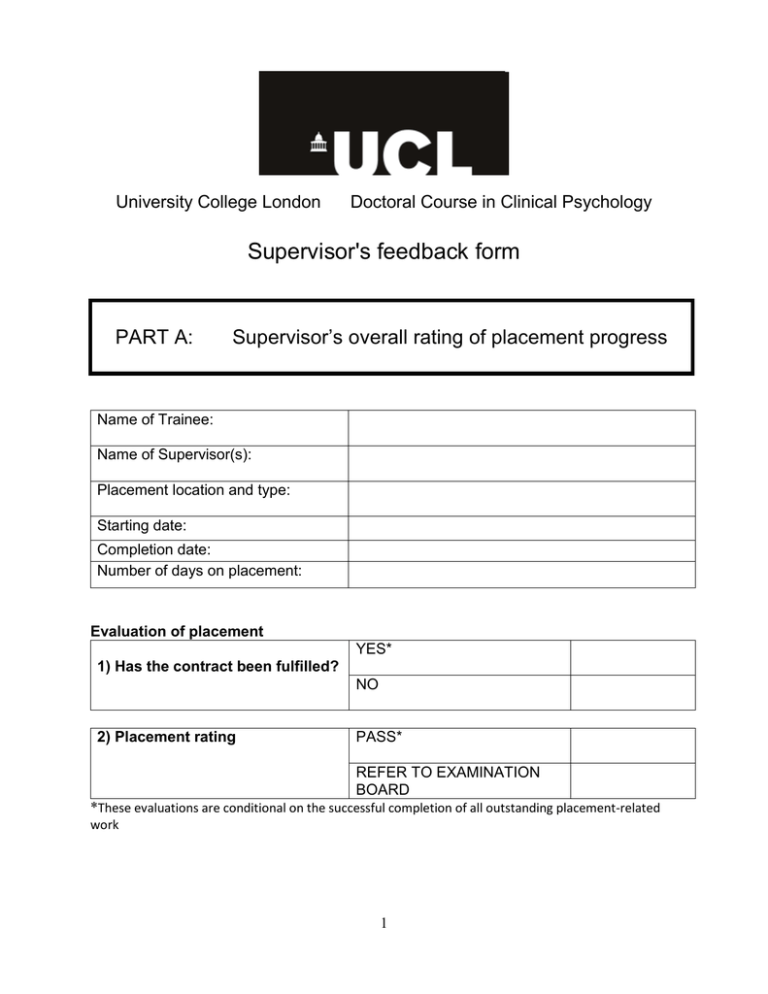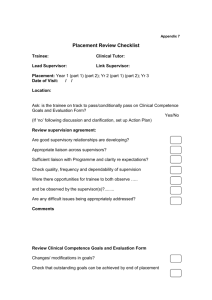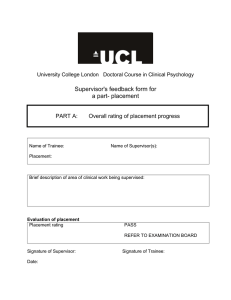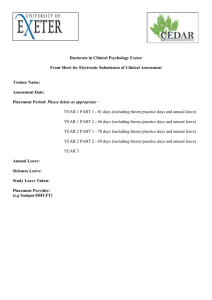Supervisor's feedback form Supervisor’s overall rating of placement progress PART A:
advertisement

University College London Doctoral Course in Clinical Psychology Supervisor's feedback form PART A: Supervisor’s overall rating of placement progress Name of Trainee: Name of Supervisor(s): Placement location and type: Starting date: Completion date: Number of days on placement: Evaluation of placement YES* 1) Has the contract been fulfilled? NO 2) Placement rating PASS* REFER TO EXAMINATION BOARD *These evaluations are conditional on the successful completion of all outstanding placement-related work 1 General Comments of Supervisor (use additional sheet if necessary) Signature of Supervisor: Date: 2 Supervisor’ Feedback form PART B – SUMMATIVE AND FORMATIVE FEEBACK Guidance note: In each domain supervisors are asked to make a series of summative judgments in relation to specific competences, followed by an overall summative judgment. Supervisors can choose where they insert formative feedback – there is space at the end of each domain, and also at the end of Part B. There is no restriction on where formative feedback is inserted, but there needs to be some! When giving formative feedback it is worth commenting on: The ways in which the trainee has shown development over the placement – e.g. in knowledge and understanding, and in skills and competences in relation to clinical, professional and supervisory areas Areas in which the trainee is working to a good standard and where you would want to commend their progress Any areas which you have indicated require further development Any areas where the trainee is not working to the standard you would expect at this stage in their training, and any comments on reasons why this might be the case 1) CAPACITY TO ENGAGE CLIENTS AND TO FORM A WORKING RELATIONSHIP YES NO Are your ratings based on observation of the trainee? appropriate to stage of training Does the trainee have the ability to: engage clients in the clinical work? introduce and negotiate issues relating to confidentiality and consent? establish a good and responsive working relationship (therapeutic alliance)? manage and resolve threats to the working relationship/alliance? maintain a consistently empathic stance? convey an open and welcoming attitude to the client? manage difficulties/challenges within the session constructively? maintain an appropriate professional manner and professional boundaries? Overall capacity to engage clients and to form a working relationship Any comments? 3 requires more development competence significantly below expected level not assessed in this placement 2) CAPACITY TO UNDERTAKE ASSESSMENTS YES NO Are your ratings based on observation of the trainee? appropriate to stage of training Does the trainee have the ability to: draw on knowledge of the range of questions appropriate to the assessment being undertaken? ask an appropriate range of questions? ask questions in an appropriate manner? adapt their style and the range of questions asked to the client's presentation and emerging "story"? structure the interview appropriately (neither too flexible nor too structured)? show evidence of an emerging understanding of the client's presentation by testing-out ideas and hypotheses with the client? adapt their interviewing style appropriately in relation to the needs of clients from differing cultural & ethnic backgrounds? adapt their interviewing style appropriately in relation to the needs of clients at different stages of life and development? adapt their interviewing style appropriately in relation to the needs of clients with different levels of ability and disability? Overall capacity to undertake assessments Any comments? 4 requires more development competence significantly below expected level not assessed in this placement 3) CAPACITY TO FORMULATE appropriate to stage of training requires more development Does the trainee have the ability to: draw together information from all relevant sources to generate initial hypotheses? build on initial hypotheses to develop a formulation which is theoretically coherent, and which accounts for the presentation, which draws on relevant psychological models, and which incorporates social, cultural and biological factors? make explicit use of formulations to identify and to implement a treatment plan? use a formulation to identify goals for areas for further assessment or intervention? revise hypotheses and formulations in the light of emerging information? competence significantly below expected level not assessed in this placement Overall capacity to formulate Any comments? 4) CAPACITY TO IMPLEMENT PSYCHOLOGICAL INTERVENTIONS Please identify the psychological interventions or therapies which were employed in this placement Therapeutic Behavioural Other: approaches Cognitive employed in CBT this placement Psychodynamic Systemic YES Are your ratings based on observation of the trainee? 5 NO Capacity to implement psychological therapies Guidance note: you can use the box below to comment on the trainee’s capacity to carry out either a single therapy or a number of therapies. If there are clear differences in the trainee’s ability to apply one model compared to another please use the formative feedback section to comment on this appropriate to stage of training requires more development Does the trainee have the ability to: draw on knowledge of the empirical basis for interventions and any implications of this for their practice? draw on knowledge of the theory underpinning the therapy being delivered? draw on knowledge of the therapeutic techniques employed in the therapeutic approach? engage clients in the model (explaining the rationale for the approach and its relevance to their presentation)? implement the model in practice, in a competent manner, and at a level appropriate to their level of training? recognise and manage any challenges to implementing the model of therapy (i.e. problemsolve when there are potential obstacles to staying on-model)? adapt the therapy to the client's needs?: in relation to factors relating to client’s presentation (e.g. concurrent problems which could make it harder to achieve therapeutic goals) in relation to clients from varying cultural and social backgrounds competence significantly below expected level not assessed in this placement If the placement involves implementing more than one model of psychological therapy: appropriate to stage of training Does the trainee have the ability to: think flexibly across more than one approach by demonstrating a coherent integration of their ideas? think critically about the utility/applicability of different therapeutic approaches in relation to current cases? Overall capacity to implement specific psychological therapies Any comments? 6 requires more development competence significantly below expected level not assessed in this placement 5) CAPACITY TO EVALUATE Please identify any formal or informal evaluation procedures employed in the placement: appropriate to stage of training requires more development competence significantly below expected level not assessed in this placement appropriate to stage of training requires more development competence significantly below expected level not assessed in this placement Does the trainee have the ability to : draw on knowledge of quality assurance and audit procedures in order to identify evaluation procedures which will be relevant to the service? draw on relevant knowledge to identify quantitative and/or qualitative evaluation procedures appropriate to the clinical approaches being employed? select and implement appropriate methods to evaluate the interventions (e.g. their effectiveness, acceptability etc)? analyse and interpret outputs from evaluation procedures? communicate outcomes from evaluation to the stakeholders who would benefit from this feedback (e.g. supervisor, clinical colleagues, clients etc)? If service-related research was carried out in this placement, did the trainee demonstrate an ability to: conduct the research in a way which ensured that any findings would be meaningful and answer questions of relevance to the service? analyse and interpret findings? communicate the findings to appropriate members of the service/ organisation? Overall capacity to evaluate Any comments? 7 6) PERSONAL-PROFESSIONAL SKILLS i) Professional skills - general professional behaviour appropriate to stage of training requires more development competence significantly below expected level not assessed in this placement appropriate to stage of training requires more development competence significantly below expected level not assessed in this placement Does the trainee have the ability to: work at an appropriate level of independence and to take a level of responsibly appropriate to their stage of training? manage and organise a reasonable workload and daily schedule? maintain a reliable schedule (e.g. good timekeeping, attending all scheduled appointments etc) ii) Professional skills – ethical practice* Does the trainee have the ability to: draw on their knowledge of relevant professional codes of conduct and apply this to clinical work? consistently conduct themselves in a manner which is congruent with ethical and professional standards? identify and discuss ethical and professional issues as they arise in clinical work? * Guidance note: In this section the standards to hold in mind are those set out in the HCPC Standards of Conduct, Performance and Ethics, the BPS Code of Ethics and Conduct and the DCP Professional Practice Guidelines iii) Professional skills - work with clinical psychologists and colleagues from other disciplines appropriate to stage of training Does the trainee have the ability to : develop and maintain a professional and respectful relationship with other staff? communicate effectively with other staff? work constructively and co-operatively in clinical situations where responsibilities are shared with other staff? achieve a balance between maintaining their professional autonomy and identity while respecting the values of colleagues? 8 requires more development competence significantly below expected level not assessed in this placement iv) Clinical-Professional skills - flexibility appropriate to stage of training requires more development competence significantly below expected level not assessed in this placement to stage of training requires more development competence significantly below expected level not assessed in this placement appropriate to stage of training requires more development competence significantly below expected level not assessed in this placement competence significantly below expected level not assessed in this placement Does the trainee have the ability to: adapt their personal style to the needs of the client and of the service? reformulate and rethink if/when new evidence emerges which challenges earlier ideas? adapt or change the therapeutic approach in the light of a reformulation? v) Clinical-Professional skills– motivation and persistence appropriate Does the trainee have the ability to : adopt a constructive and realistic approach to difficulties which emerge? persist in managing challenging clinical situations? show interest rather than despair when faced with difficulties? Overall capacity - personal-professional skills Any comments? 7) CAPACITY FOR COMMUNICATION Written communications Does the trainee have the ability to maintain clinical records and prepare reports and letters: to an appropriate standard, without the need for major revision or editing? that demonstrate clarity of thought and expression? that are appropriately structured and phrased in relation to their intended recipients/ readers? that are completed/submitted promptly, in line with local service standards? Verbal communications with colleagues and fellow professionals Does the trainee have the ability to communicate verbally in a professional context: in a manner which conveys information clearly and professionally and respectfully? in a manner which is tailored to the recipient(s)? 9 appropriate to stage of training requires more development Teaching and training appropriate to stage of training requires more development Does the trainee have the ability to: orient content and teaching methods in line with the aims of teaching? adapt content and teaching methods in line with the knowledge, developmental level and expectations of the audience? present material clearly and effectively? competence significantly below expected level not assessed in this placement Overall capacity for communication Any comments? 8) “SERVICE-DELIVERY” – WORKING WITH THE ORGANISATION AND WITH SERVICE USERS Work with the organisation appropriate to stage of training Does the trainee have the ability to: understand local work/organisational context and decision-making structures, including the location of clinical psychology within the organisation? draw on knowledge of relevant national and legislative contexts and apply this to local services? participate effectively within those aspects of the organisational structure relevant to their role? work effectively with multi-disciplinary teams or other aspects of the organisation in order to develop and implement clinical plans? draw on knowledge of change processes in service delivery systems in order to achieve objectives (e.g. implementing clinical plans)? supervise/support the work of other professionals (at a level appropriate to their current level of competence)? 10 requires more development competence significantly below expected level not assessed in this placement Work with service-users and carers appropriate to stage of training requires more development Does the trainee have the ability to: draw on knowledge of ways in which service users and carers can be involved in service planning facilitate the involvement of service users and carers in service planning make links with service users and/or carers in order to understand their perspectives on the service* competence significantly below expected level not assessed in this placement * Guidance note: it is a course requirement that trainees undertake this in at least one placement Overall capacity to work with the organisation and service users Any comments? 9) CAPACITY TO USE SUPERVISION Use of supervision appropriate to stage of training requires more development competence significantly below expected level not assessed in this placement appropriate to stage of training requires more development competence significantly below expected level not assessed in this placement Does the trainee have the ability to: use supervision flexibly to meet training needs? (i.e. to seek reassurance, anxiety reduction, to gain feedback or to learn, as appropriate, asking for advice and guidance) listen to and make use of feedback? listen to and respond appropriately to constructive criticism? listen to and act on advice? Capacity for accurate self-appraisal Does the trainee have the ability to: show evidence of being reflexive - i.e. realistic about his/her capabilities? be realistic about their own capabilities and about their limitations? 11 Capacity to contribute actively to supervision appropriate to stage of training Does the trainee have the ability to: make an active contribution to supervision (e.g. being well prepared, reading suggested material, identifying relevant material for themselves)? suggest ways of understanding clinical issues from a psychological perspective? actively suggest ways forward, based on their understanding of relevant clinical issues? Overall capacity to use supervision Any comments? 12 requires more development competence significantly below expected level not assessed in this placement SKILLS IN PSYCHOMETRIC ASSESSMENT YES NO YES NO Was psychometric assessment a part of the placement? If NO then move to the next section Were you able to observe the trainee undertaking psychometric assessments? appropriate to stage of training Does the trainee have the ability to: draw on relevant knowledge regarding the principles of psychometric assessment? draw on knowledge about which tests to use and what the tests measure? draw on knowledge to choose appropriate psychometric tests for complex cases? carry out testing procedures reliably and in line with test protocols? adjust test procedures appropriately to accommodate client’s capacity to undertake testing (e.g. language, social or psychological factors)? interpret test results accurately and in line with the limitations/ variations of test procedures? give appropriately tailored verbal and written feedback to clients? give appropriately tailored verbal and written feedback to professionals? Overall capacity to implement psychometric assessment Any comments? 13 requires more development competence significantly below expected level not assessed in this placement FEEDBACK ON AREAS OF COMPETENCE SPECIFIC TO THIS PLACEMENT (and not covered in the foregoing sections) In some settings trainees may be expected to develop and apply skills and competences that are not listed above. If this is the case supervisors can use the table below to identify these skills and rate trainee progress. (If the foregoing sections have already covered the skills and competences which supervisors feel are relevant they do not need to complete this table). a) identify (and insert) specific areas of clinical and professional skills and competences which a trainee needs to demonstrate in your placement b) rate progress with these competences Areas of competence specific to your placement 14 appropriate to stage of training requires more development competence significantly below expected level FORMATIVE FEEBACK Guidance note: The summative ratings above only allow supervisors to identify whether trainees are performing at or below a level “appropriate” to their stage of training. As such they don’t include the option of identifying performance above the expected level, or allow supervisors to give specific and detailed feedback about progress. Bearing in mind the domains and ratings above, please give feedback to help identify: The ways in which the trainee has shown development over the placement – e.g. in knowledge and understanding, and in skills and competences in relation to clinical, professional and supervisory areas Areas in which the trainee is working to a good standard and where you would want to commend their progress Any areas which you have indicated require further development Any areas where the trainee is not working to the standard you would expect at this stage in their training, and any comments on reasons why this might be the case If formative feedback has already been inserted at the end of each section, this space can be used to expand on this (in particular to give an overview of progress across all domains). 15 University College London Doctoral Course in Clinical Psychology Part C: Supervisor’s feedback form Feedback for the attention of the next supervisor Guidance note: This section is designed to help make the trainee's next supervisor more aware of areas in which the trainee functions well, where they need to continue building on current skills, and where they need to focus more attention. Trainees name: Supervisor’s name and Placement: Areas of strength/ achievements: Areas where the trainee would benefit from building on current skills: 16




